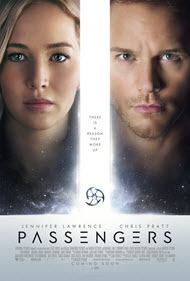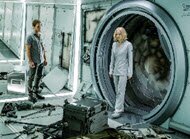Passengers
 for sexuality, nudity and action/peril.
for sexuality, nudity and action/peril.
Reviewed by: Curtis McParland
CONTRIBUTOR
| Moral Rating: | Offensive |
| Moviemaking Quality: |
|
| Primary Audience: | Adults Older Teens |
| Genre: | Sci-Fi Adventure Romance |
| Length: | 1 hr. 56 min. |
| Year of Release: | 2016 |
| USA Release: |
December 21, 2016 (wide—3,478 theaters) DVD: March 14, 2017 |





loneliness
desperation
FEAR, Anxiety and Worry—What does the Bible say? Answer
selfishness
keeping a big secret from someone
What is SIN?
What are goodness and righteousness?
always make the most of where you are






| Featuring |
|---|
|
Jennifer Lawrence … Aurora Lane Chris Pratt … James Preston Michael Sheen … Arthur Andy Garcia … Captain Norris Laurence Fishburne … Gus Mancuso Kimberly Battista … Jr Officer Fitzgerald Jamie Soricelli … Space Cruise Passenger Aurora Perrineau … Celeste See all » |
| Director |
| Morten Tyldum — “The Imitation Game” (2014) |
| Producer |
|
Columbia Pictures LStar Capital See all » |
| Distributor |
“There is a reason they woke up”
Traveling can be fun. But for some, it can be downright stressful. However, neither is really the case for Jim Prescott (Chris Pratt) as he embarks on a journey to a new home. But this new home isn’t a new state or a new country. It’s a new planet. Homestead II is the name, and 5,000 passengers in total plan to create a fresh start as they travel millions of miles away from Earth on the Starship Avalon. Since the journey will be about 120 years, each passenger is placed into a “hibernation” state as they travel.
Jim doesn’t plan to have much fun on this trip, nor does he feel too stressed out about the long journey, that is, until he wakes up… 90 years too early. After an asteroid strike, Jim’s hibernation pod malfunctions, causing him, and only him, to wake up. Fortunately, no other passengers are affected. Jim isn’t too thankful, though, and begins to live a lonely life on the spacecraft.
Jim desperately tries to find ways to go back into hibernation and communicate with Earth, but to no avail. He makes a new “friend” along the way, though, as he meets Arthur (Michael Sheen), a robot bartender on the ship. However, this “friend” is not a satisfying human connection for Jim, and he becomes extremely lonely.
He later discovers a beautiful woman still in hibernation, by the name of Aurora (Jennifer Lawrence). Jim immediately falls in love and struggles with whether he should break into her hibernation pod and wake her up or not. Jim realizes that it would be wrong and selfish to wake her up, but he has also struggled with desperate loneliness, depression, and lack of human connection for over a year.
After much debate, Jim gives in and decides to wake Aurora. As the two begin to develop a strong relationship, though, they both realize that they’re in much more danger than they originally thought. Their mission was originally to make it to a new home. Now it’s survival.
Following 2014’s critically acclaimed “The Imitation Game,” director Morten Tyldum decided to take his next film into space. “Passengers” isn’t your typical science-fiction or romance film, though. It is a film that focuses more on human connection and what it means to develop a human relationship. Still, “Passengers” is filled with plenty of action and romance from both sides of the spectrum.
Although there is a lot going for the film, the storyline is a bit clichéd and predictable, for the exception of a few solid plot twists. The visuals are gorgeous, and although this isn’t Tyldum’s strongest directorial effort, his direction still saves the film from being a complete failure. The dialog is rather weak and although the story itself isn’t very engaging, it’s still entertaining. Chris Pratt and Jennifer Lawrence serve as likable characters, but do not give their strongest performances in this two hour film. “Passengers,” while fairly entertaining, certainly has its faults in terms of storytelling and could have been something “great” rather than “good,” if only the plot was fleshed out more.
Most Romance films today can never seem to stay away from sexual content. “Passengers” serves as the perfect example, as we see our two leads get sensual on screen, as they begin to disrobe and make love in a few scenes. Though not explicit, both Jim and Aurora passionately kiss and begin to disrobe as they prepare to have sex on both a table and a bed. One scene involves brief partial breast nudity, as Aurora begins to undress, and it appears that the couple share a bed. Jim and Aurora lay in bed covered in sheets. We also witness one more (mostly dark) scene where the couple is in bed, making love once again. We see some shadowy movements and more passionate kissing.
Before Jim and Aurora develop their romantic relationship, we see Aurora begin to undress, and she tells Jim to turn around, as she changes into a spacesuit. We only see her from the shoulders up. We see Aurora swimming in a laced bikini on a few occasions and also see Jim shirtless a few times. In two separate scenes before Jim meets Aurora, his bare rear is exposed, as he walks down a hallway naked (his front is covered by a sheet) and as he takes a shower. Both scenes are brief. There is talk about a guy not wearing any pants, and Aurora is also seen wearing a low cut tank and nightgown.
The language in “Passengers” is relatively mild, as we only hear one s-word, three uses each of both d*mn and h*ll, and one use of “son of a b**ch.” The word “screwed” is used twice and some may pick up one or two possible misuses of God’s name amidst the perilous situations.
The violence, though not graphic, is intense at times, as the journey of the Starship Avalon becomes more and more perilous. *Please continue to read with caution as this portion of the review may contain spoilers due to there being such a small cast*. Jim injects himself with a needle in one scene, and after being alone for so long eventually contemplates suicide. Characters take some nasty falls from both slipping and gravity swinging back and forth on the ship. One character smashes a piece of glass out of anger, and Jim slaps Arthur just to prove to him he cannot feel anything. Aurora gets angry at Jim and pummels him while he’s asleep. She gives him a few hard kicks as well and raises a crow bar. She doesn’t use it, though.
One character nearly drowns while swimming. Another coughs up blood and collapses from a health condition. Arthur begins to malfunction at one point and bangs his head against the bar counter. He cuts his head on glass and some wounds are seen. We see some “flesh” and the robotics underneath (not graphic). Characters get tossed around by hurling winds, one gets trapped between two doors, and there are some big explosions as flames go wild and nearly burn our heroes. Machines crash and break and debris goes flying in one scene. One character gets impaled by a piece and blood gushes out as the piece gets removed. Characters are nearly frozen to death and get burned when they touch certain things. Though protected, a character gets engulfed in flames and shot out into space. The characters are in constant peril throughout most of the film.
There is a fair amount of alcohol consumption as the couple hangs out at the ship’s bar. They appear slightly tipsy a couple of times.
“Two are better than one, because they have a good reward for their toil. For if they fall, one will lift up his fellow. But woe to him who is alone when he falls and has not another to lift him up!” —Ecclesiastes 4:9-10 (ESV)
Yes, two is certainly better than one. But “Passengers” takes the wrong approach, as our heroes dive into a sexual relationship. The film does touch on some powerful themes, though, as the importance of companionship is displayed, self-sacrifice is applauded, and courage and bravery are both held in high honor. “Passengers” shares a bold message. Loneliness is a terrible, terrible thing and humans were never intended to be alone. We were meant to have companionship, whether it just be a casual friendship or a romantic relationship. The story of “Passengers” obviously focuses on the latter. But the film still does a solid job of portraying how loneliness and depression affect an isolated individual, and how he or she can be lifted up by having a companion.
“Passengers” also touches on how desperation and selfishness can cause one to fall, and we see this through Jim’s character as he struggles with temptations in the first act of the film. We also bear witness to how his selfishness affects his relationship with Aurora. A small message on the sanctity of life is also displayed, as Jim struggles with thoughts of suicide. We can see through Jim’s actions, he values life and that suicide is not the answer to his current situation.
“Fear not, for I am with you; be not dismayed, for I am your God; I will strengthen you, I will help you, I will uphold you with my righteous right hand.” —Isaiah 41:10
“Passengers” isn’t really anything special. It is somewhat predictable, but it’s engaging, thanks to its likable characters. It certainly isn’t “Titanic” in space, that’s for sure. The film does, however, touch on the fact that technology is too heavily relied on and that it is imperfect. The only content to really be concerned about in this science-fiction romance is the sexual content; though that should be enough for most Christian audiences to take a pass. The violence, though intense at times, really isn’t graphic nor is the language very profane. “Passengers” has some uplifting messages about life, but, sadly, the filmmakers decided to go with on-screen sexuality, which prevents this film from being family-friendly. Sadly, most audiences today embrace this form of lifestyle portrayed, and this film serves as a reminder of the ungodly, secular culture we live in.
1 Corinthians 6:18 shares,
“Flee from sexual immorality. Every other sin a person commits is outside the body, but the sexually immoral person sins against his own body.”
I tend to share this verse a lot, but it serves as an excellent reminder of the true consequences of sexual immorality. “Passengers” doesn’t show any consequences. In fact, it displays that having a sexual relationship outside of marriage is perfectly normal and acceptable. The film may have some powerful and heart-wrenching moments, but it’s messages of true love and development of a romantic relationship are nothing short of problematic. In the end, “Passengers” is a story about two lost souls who confide in each other and don’t even give God a second thought.
“No temptation has overtaken you that is not common to man. God is faithful, and He will not let you be tempted beyond your ability, but with the temptation He will also provide the way of escape, that you may be able to endure it.” —1 Corinthians 10:13
Violence: Moderate / Profanity: Mild to Moderate / Sex/Nudity: Heavy
See list of Relevant Issues—questions-and-answers.


Soon after, man and woman lose contact with / sight of God (their spiritual death). The first Adam (the first year) is sinful and unrepenting. The Second Adam (the second year) repents (thus the Son of Man is come). He is the second Adam, Jesus. God is out of sight, but has passed his authority to the Son of Man. See all »
Moral rating: Better than Average / Moviemaking quality: 4
I was surprised how violent her attack was on him one time, outright abuse. There is no cursing, however they drink a lot, but they aren’t usually getting drunk, only a few times in the beginning. The graphics were very good, amazing actually. I didn’t know how they were going to pull this movie off, but they did.See all »
Moral rating: Offensive / Moviemaking quality: 5
This movie will most likely turn people away from thoughts of “living aboard a space station” or “future civilizations on another planet in the universe,” just because of the sheer emptiness of living away from people and our Earth. I am glad I watched the film to be reminded of the beauty of our earthly home (until we reach our permanent Home in heaven) and to thank God for all He has provided for us here.
Moral rating: Average / Moviemaking quality: 4½
The most serious immoral act is actually Jim waking Aurora up in the first place, thereby (as far as he knows) dooming her to the same fate as himself, and then lying to her and pretending that her pod malfunctioned. That means that their entire relationship—whatever it is—is based on deception and rooted in his selfishness.
Worse yet, the story is written in such a way that later events appear to justify his actions, after the fact. If he had not awakened her, they would’ve been one person short of what was needed to keep the ship from self-destructing. Although that’s true, it has nothing to do with Jim’s original motivation nor with the immorality of his actions.
Moral rating: Offensive / Moviemaking quality: 4½
Moral rating: Extremely Offensive / Moviemaking quality: 5
Boy and girl and 500+ other people are in suspended animation for a 90+ year trip through space, where a corporation has set up a highly profitable alternative planet for those who don’t like what earth has become to start their lives over. Ship hits meteor and starts to dysfunction. Boy wakes up, spends a year totally alone in a high tech resort (with a robot bartender companion providing dialogue but missing much humanity), but seeing girl in suspended animation, decides he needs her and wakes her up, dooming her to a different life span than she had planned.
Boy doesn’t tell girl he did this. Boy and girl fall in love, make love. Girl finds out that boy woke her up, boy loses girl, stalker issues arise.
Plot shifts as Lawrence Fishburne appears briefly as deus ex machina with information about the ship being in peril and how to fix it, then dies.
***SPOILER*** Action movie begins. Boy faces probable death to save ship. Girl, having apparently seen “The Martian” where an identical rescue happens, saves boy. Boy discovers that girl could go back into suspended animation, but she chooses not to. He puts a ring on her finger. 90 years later everyone else awakens and finds the couple has turned the ship into a verdant paradise, before presumably passing on. (I actually expected they might wake up the midwife and have produced several generations of descendants, but the screenwriters didn’t go there.) ***END SPOILER***
So, most interesting are all the seeds of issues that were planted, but not watered. How good is high tech, high security capitalism where people have to pay big bucks to go elsewhere in hope of a decent life? All the robotic customer service and security features of the ship (and our lives today) are critiqued. Should we expect technology to run amok and fail? What should the boy have done? Go crazy? Kill himself? Wake up everyone? Become a monk? Should he have told her up front that he woke her up, and what would happen then? What should happen?
There are of course a lot of Adam and Eve parallels (Adam did not have to intrude on Eve’s life plans to find a companion). Should we expect them to delay sex until after “marriage”? What should happen if some people are in suspended animation and some aren't, but everyone’s life span is the same? What about mortality, sacrifice, passing on the world to the next generation, the meaning of life and what we are to do with it?
Where is God in all this and what would Jesus have us do? None of this got very far into the film, but may be the best takeaway.
Moral rating: Average / Moviemaking quality: 3½
PLEASE share your observations and insights to be posted here.


My Ratings: Moral rating: Average / Moviemaking quality: 4½